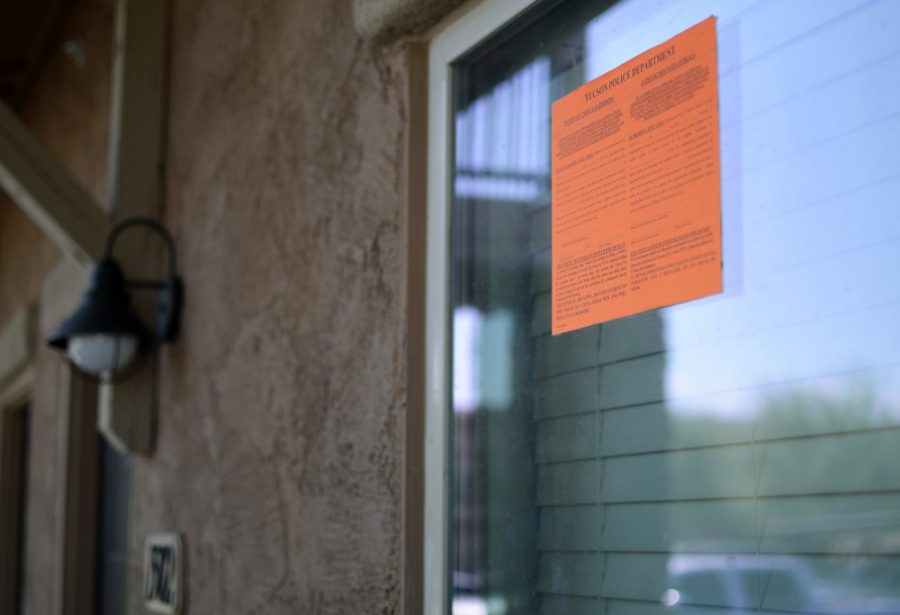The University of Arizona Police Department will soon partner up with the Tucson Police Department to work with their recently formed Red Tag unit, which works with citations for unruly gatherings.
Beginning Saturday, UAPD officers will ride with TPD officers every Saturday for calls of unruly gatherings off-campus where UA students are believed to be present, according to UAPD Public Information Officer Rene Hernandez. When students are cited with unruly gatherings, the Dean of Students Office will be notified and disciplinary action may follow.
“We want to make sure that our students are being upstanding citizens and really represent the UA in a good manner with their names in the community,” Hernandez said.
The idea for the partnership was influenced by a discussion between the chiefs of the two police departments about how many college students live within a mile radius of campus.
Hernandez said he thinks that collaboration between the two departments will benefit them both.
“We have a really good working relationship with TPD and this is only going to enhance it,” Hernandez said.
While UAPD and TPD have worked together in the past with education initiatives, this combination of jurisdictions between the two departments adds a new way for the departments to interact.
TPD Officer Jaime Burnettsaid this partnership with the departments can help familiarize UAPD officers with city code implications and also help the departments collaborate on “better solutions to resolve the community’s quality-of-life issues.”
“If [UAPD] can get a handle on what it is that is the problem out here on our end, they may be able to offer some resolutions or solutions for dealing with it or curbing some of the issues,” Burnett said. “It’s not the case that anybody thinks that when you’re in college you should never be able to go to a party or have a good time or gather with friends, that’s not the issue. The issue is just when those gatherings get to the level where it’s disturbing other people.”
While UAPD works with TPD with red tag incidents, TPD will be the one to take the calls that notify officers of an incidence of an unruly gathering, and so these incidents will not be included in the UA’s annual Campus Safety, Security and Fire Safety Report or Clery report, according to Hernandez.
Red tags, which are posted when there is a citation for an unruly gathering, are not limited to the UA area.
Burnett said, while the work of UAPD officers with TPD officers will mostly be concentrated in the area around campus, TPD’s Red Tag unit works throughout the city of Tucson, as unruly gatherings happen everywhere.
“It really is a quality-of-life issue for those people that live in those neighborhoods where either they’re constantly having problems or maybe they have just one particular neighbor,” Burnett said. “It’s not necessarily just a college issue.”
Though red tags happen all over the city, they are now monitored within a centralized unit of TPD — the Red Tag unit, which was formed several months ago.
TPD used to track red tags by their division, with each division using their own system. Now, the tracking and enforcing of red tags is done within one central unit “for consistency’s sake,” Burnett said.
Burnett said neighborhoods affected by red tag incidents appreciate the enforcement of these tags.
Some students, such as neuroscience senior Maya Sabbagh, are aware of the problems that can arise with noisy situations.
“I remember when I used to live in my apartment that was right next to a neighborhood, they would get a lot of noise complaints, and I honestly don’t blame them because a lot of the times it was like multiple parties at once so it was like almost too much,” Sabbagh said. “It’s just when it’s in a small place it just seems to exacerbate the problem.”
Sabbagh said she thinks that some students might not respond well to receiving a red tag.
“When you’re told to do anything, most people respond negatively,” she said.
Red tags are more than a warning to be quieter. Unruly gatherings, or gatherings of at least five people that create a disturbance, are issued citations, and the residence of the gathering has a red tag posted on it that remains there for 180 days.
The minimum charge for a first offense is $500, with charges increasing if there are additional violations in that residence during its 180-day period.
Hernandez said he thinks UAPD’s work with TPD on red tags will be positive and will let students know that they want them to be good neighbors.
“We want them to represent the university in a good light whether they are on campus or off campus, so I think this is going to be a positive thing, not only for the UA but also for the communities out there, that they can say we’re actually trying to make their standard of living higher,” he said.
Burnett said that the departments’ partnership can offer a new way for TPD to network with the UA.
“If we can build those good communications, we can all work toward finding that balance and resolving the problem part of these gatherings and hopefully making it so that everybody can enjoy their individual experiences without impeding anybody else’s enjoyment, [or] use of their property or their peace,” Burnett said.
Follow Ava Garcia on Twitter.









